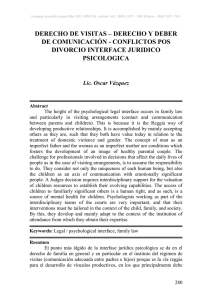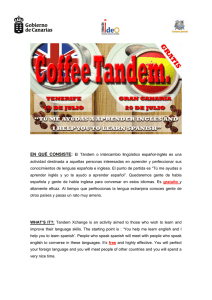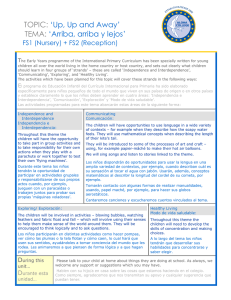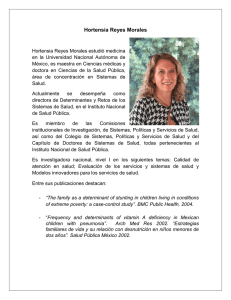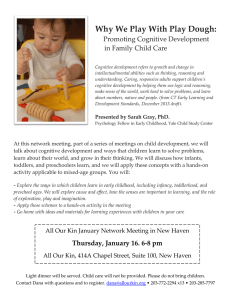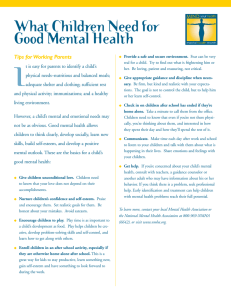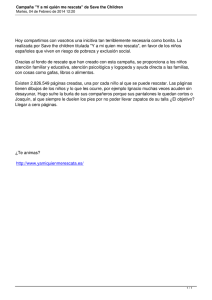e Helping Children Learn Language
Anuncio
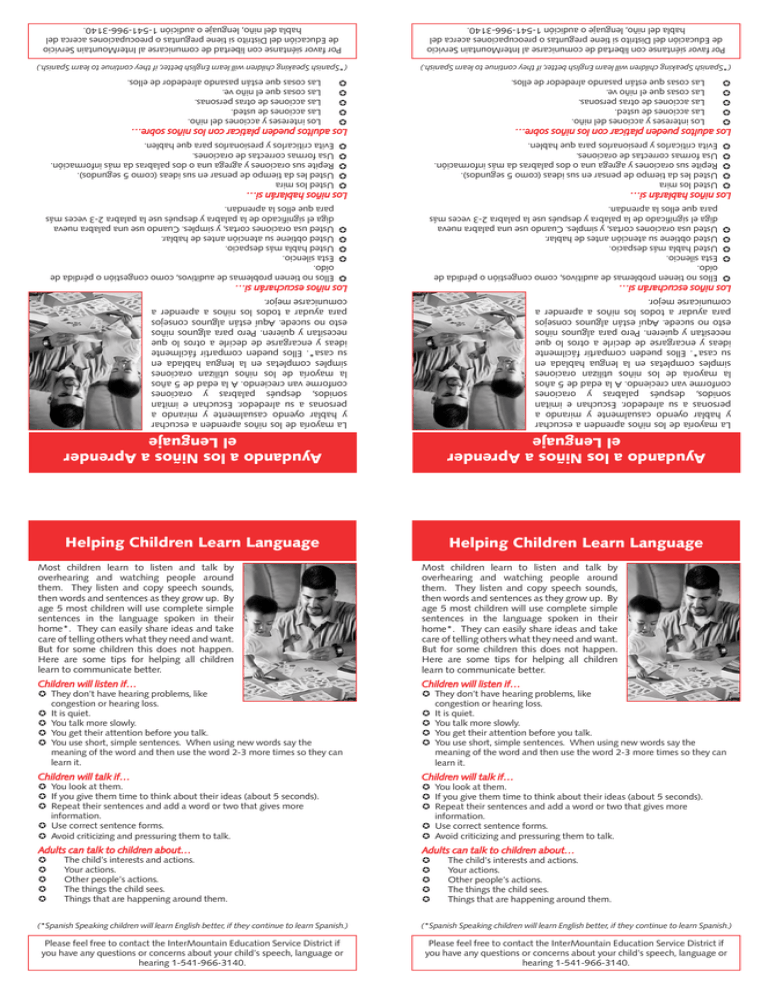
Most children learn to listen and talk by overhearing and watching people around them. They listen and copy speech sounds, then words and sentences as they grow up. By age 5 most children will use complete simple sentences in the language spoken in their home*. They can easily share ideas and take care of telling others what they need and want. But for some children this does not happen. Here are some tips for helping all children learn to communicate better. Most children learn to listen and talk by overhearing and watching people around them. They listen and copy speech sounds, then words and sentences as they grow up. By age 5 most children will use complete simple sentences in the language spoken in their home*. They can easily share ideas and take care of telling others what they need and want. But for some children this does not happen. Here are some tips for helping all children learn to communicate better. Children will listen if… Children will listen if… Children will talk if… Children will talk if… Adults can talk to children about… Adults can talk to children about… (*Spanish Speaking children will learn English better, if they continue to learn Spanish.) (*Spanish Speaking children will learn English better, if they continue to learn Spanish.) Please feel free to contact the InterMountain Education Service District if you have any questions or concerns about your child’s speech, language or hearing 1-541-966-3140. Please feel free to contact the InterMountain Education Service District if you have any questions or concerns about your child’s speech, language or hearing 1-541-966-3140. The child’s interests and actions. Your actions. Other people’s actions. The things the child sees. Things that are happening around them. The child’s interests and actions. Your actions. Other people’s actions. The things the child sees. Things that are happening around them. You look at them. If you give them time to think about their ideas (about 5 seconds). Repeat their sentences and add a word or two that gives more information. Use correct sentence forms. Avoid criticizing and pressuring them to talk. They don’t have hearing problems, like congestion or hearing loss. It is quiet. You talk more slowly. You get their attention before you talk. You use short, simple sentences. When using new words say the meaning of the word and then use the word 2-3 more times so they can learn it. Ayudando a los Niños a Aprender el Lenguaje Ayudando a los Niños a Aprender el Lenguaje Helping Children Learn Language La mayoría de los niños aprenden a escuchar y hablar oyendo casualmente y mirando a personas a su alrededor. Escuchan e imitan sonidos, después palabras y oraciones conforme van creciendo. A la edad de 5 años la mayoría de los niños utilizan oraciones simples completas en la lengua hablada en su casa*. Ellos pueden compartir fácilmente ideas y encargarse de decirle a otros lo que necesitan y quieren. Pero para algunos niños esto no sucede. Aquí están algunos consejos para ayudar a todos los niños a aprender a comunicarse mejor. You look at them. If you give them time to think about their ideas (about 5 seconds). Repeat their sentences and add a word or two that gives more information. Use correct sentence forms. Avoid criticizing and pressuring them to talk. They don’t have hearing problems, like congestion or hearing loss. It is quiet. You talk more slowly. You get their attention before you talk. You use short, simple sentences. When using new words say the meaning of the word and then use the word 2-3 more times so they can learn it. Helping Children Learn Language La mayoría de los niños aprenden a escuchar y hablar oyendo casualmente y mirando a personas a su alrededor. Escuchan e imitan sonidos, después palabras y oraciones conforme van creciendo. A la edad de 5 años la mayoría de los niños utilizan oraciones simples completas en la lengua hablada en su casa*. Ellos pueden compartir fácilmente ideas y encargarse de decirle a otros lo que necesitan y quieren. Pero para algunos niños esto no sucede. Aquí están algunos consejos para ayudar a todos los niños a aprender a comunicarse mejor. Los niños escucharán si… Los niños escucharán si… Usted los mira Usted les da tiempo de pensar en sus ideas (como 5 segundos). Repite sus oraciones y agrega una o dos palabras da más información. Usa formas correctas de oraciones. Evita criticarlos y presionarlos para que hablen. Usted los mira Usted les da tiempo de pensar en sus ideas (como 5 segundos). Repite sus oraciones y agrega una o dos palabras da más información. Usa formas correctas de oraciones. Evita criticarlos y presionarlos para que hablen. Ellos no tienen problemas de auditivos, como congestión o pérdida de oído. Esta silencio. Usted habla más despacio. Usted obtiene su atención antes de hablar. Usted usa oraciones cortas, y simples. Cuando use una palabra nueva diga el significado de la palabra y después use la palabra 2-3 veces más para que ellos la aprendan. Ellos no tienen problemas de auditivos, como congestión o pérdida de oído. Esta silencio. Usted habla más despacio. Usted obtiene su atención antes de hablar. Usted usa oraciones cortas, y simples. Cuando use una palabra nueva diga el significado de la palabra y después use la palabra 2-3 veces más para que ellos la aprendan. Los niños hablarán si… Los niños hablarán si… Los adultos pueden platicar con los niños sobre… Los adultos pueden platicar con los niños sobre… Los intereses y acciones del niño. Las acciones de usted. Las acciones de otras personas. Las cosas que el niño ve. Las cosas que están pasando alrededor de ellos. Los intereses y acciones del niño. Las acciones de usted. Las acciones de otras personas. Las cosas que el niño ve. Las cosas que están pasando alrededor de ellos. Por favor siéntanse con libertad de comunicarse al InterMountain Servicio de Educación del Distrito si tiene preguntas o preocupaciones acerca del habla del niño, lenguaje o audición 1-541-966-3140. Por favor siéntanse con libertad de comunicarse al InterMountain Servicio de Educación del Distrito si tiene preguntas o preocupaciones acerca del habla del niño, lenguaje o audición 1-541-966-3140. (*Spanish Speaking children will learn English better, if they continue to learn Spanish.) (*Spanish Speaking children will learn English better, if they continue to learn Spanish.) Please feel free to contact the InterMountain Education Service District if you have any questions or concerns about your child’s speech, language or hearing 1-541-966-3140. Please feel free to contact the InterMountain Education Service District if you have any questions or concerns about your child’s speech, language or hearing 1-541-966-3140. (*Spanish Speaking children will learn English better, if they continue to learn Spanish.) (*Spanish Speaking children will learn English better, if they continue to learn Spanish.) The child’s interests and actions. Your actions. Other people’s actions. The things the child sees. Things that are happening around them. The child’s interests and actions. Your actions. Other people’s actions. The things the child sees. Things that are happening around them. Adults can talk to children about… Adults can talk to children about… You look at them. If you give them time to think about their ideas (about 5 seconds). Repeat their sentences and add a word or two that gives more information. Use correct sentence forms. Avoid criticizing and pressuring them to talk. You look at them. If you give them time to think about their ideas (about 5 seconds). Repeat their sentences and add a word or two that gives more information. Use correct sentence forms. Avoid criticizing and pressuring them to talk. They don’t have hearing problems, like congestion or hearing loss. It is quiet. You talk more slowly. You get their attention before you talk. You use short, simple sentences. When using new words say the meaning of the word and then use the word 2-3 more times so they can learn it. They don’t have hearing problems, like congestion or hearing loss. It is quiet. You talk more slowly. You get their attention before you talk. You use short, simple sentences. When using new words say the meaning of the word and then use the word 2-3 more times so they can learn it. Children will talk if… Children will talk if… Children will listen if… Children will listen if… Most children learn to listen and talk by overhearing and watching people around them. They listen and copy speech sounds, then words and sentences as they grow up. By age 5 most children will use complete simple sentences in the language spoken in their home*. They can easily share ideas and take care of telling others what they need and want. But for some children this does not happen. Here are some tips for helping all children learn to communicate better. Most children learn to listen and talk by overhearing and watching people around them. They listen and copy speech sounds, then words and sentences as they grow up. By age 5 most children will use complete simple sentences in the language spoken in their home*. They can easily share ideas and take care of telling others what they need and want. But for some children this does not happen. Here are some tips for helping all children learn to communicate better. Helping Children Learn Language Helping Children Learn Language Ayudando a los Niños a Aprender el Lenguaje Ayudando a los Niños a Aprender el Lenguaje La mayoría de los niños aprenden a escuchar y hablar oyendo casualmente y mirando a personas a su alrededor. Escuchan e imitan sonidos, después palabras y oraciones conforme van creciendo. A la edad de 5 años la mayoría de los niños utilizan oraciones simples completas en la lengua hablada en su casa*. Ellos pueden compartir fácilmente ideas y encargarse de decirle a otros lo que necesitan y quieren. Pero para algunos niños esto no sucede. Aquí están algunos consejos para ayudar a todos los niños a aprender a comunicarse mejor. La mayoría de los niños aprenden a escuchar y hablar oyendo casualmente y mirando a personas a su alrededor. Escuchan e imitan sonidos, después palabras y oraciones conforme van creciendo. A la edad de 5 años la mayoría de los niños utilizan oraciones simples completas en la lengua hablada en su casa*. Ellos pueden compartir fácilmente ideas y encargarse de decirle a otros lo que necesitan y quieren. Pero para algunos niños esto no sucede. Aquí están algunos consejos para ayudar a todos los niños a aprender a comunicarse mejor. Los niños escucharán si… Los niños escucharán si… Los niños hablarán si… Los niños hablarán si… Los adultos pueden platicar con los niños sobre… Los adultos pueden platicar con los niños sobre… (*Spanish Speaking children will learn English better, if they continue to learn Spanish.) (*Spanish Speaking children will learn English better, if they continue to learn Spanish.) Por favor siéntanse con libertad de comunicarse al InterMountain Servicio de Educación del Distrito si tiene preguntas o preocupaciones acerca del habla del niño, lenguaje o audición 1-541-966-3140. Por favor siéntanse con libertad de comunicarse al InterMountain Servicio de Educación del Distrito si tiene preguntas o preocupaciones acerca del habla del niño, lenguaje o audición 1-541-966-3140. Ellos no tienen problemas de auditivos, como congestión o pérdida de oído. Esta silencio. Usted habla más despacio. Usted obtiene su atención antes de hablar. Usted usa oraciones cortas, y simples. Cuando use una palabra nueva diga el significado de la palabra y después use la palabra 2-3 veces más para que ellos la aprendan. Usted los mira Usted les da tiempo de pensar en sus ideas (como 5 segundos). Repite sus oraciones y agrega una o dos palabras da más información. Usa formas correctas de oraciones. Evita criticarlos y presionarlos para que hablen. Los intereses y acciones del niño. Las acciones de usted. Las acciones de otras personas. Las cosas que el niño ve. Las cosas que están pasando alrededor de ellos. Ellos no tienen problemas de auditivos, como congestión o pérdida de oído. Esta silencio. Usted habla más despacio. Usted obtiene su atención antes de hablar. Usted usa oraciones cortas, y simples. Cuando use una palabra nueva diga el significado de la palabra y después use la palabra 2-3 veces más para que ellos la aprendan. Usted los mira Usted les da tiempo de pensar en sus ideas (como 5 segundos). Repite sus oraciones y agrega una o dos palabras da más información. Usa formas correctas de oraciones. Evita criticarlos y presionarlos para que hablen. Los intereses y acciones del niño. Las acciones de usted. Las acciones de otras personas. Las cosas que el niño ve. Las cosas que están pasando alrededor de ellos.

